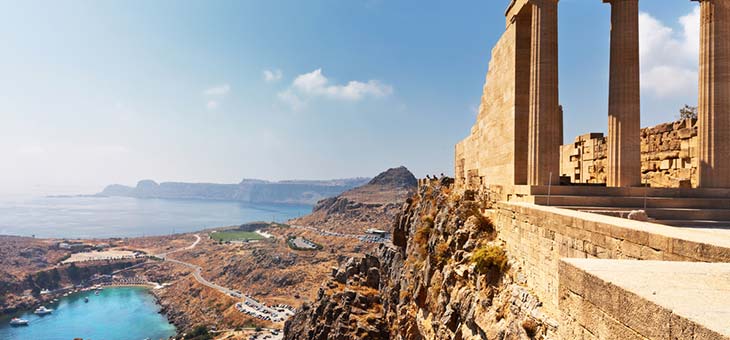The more I travel and experience life, the more it confirms in me the idea that you cannot eat history.
The island of Rhodes has had a chequered history, dating back millennia. It seems that everyone has had and wanted a piece of it. The ancient Minoans, Greeks and Romans left their mark. Then a series of invaders came and went – the Turks and the Italians. The harbour at Rhodes has seen numerous sea battles as well as trading vessels from all over the Mediterranean, plying their trade between the Asia Minor coast and here, and then on to far-flung ports. The most famously recognised association is with the Knights of St John who managed to remain here for many years.
The walls of the old city citadel are 20m high and then inside is a gap for the moat and then another high protective wall. The architecture is medieval, dating back to the 14th century. The stones are pitted and weathered but still thick and able to serve their purpose.
History oozes out of every twist and turn in the cobblestoned streets. All of this has been beautifully kept and no doubt restored in many places.
But there is another side to Rhodes and that is the flood of tourists who flock here for the long summer. Being further south than many Greek islands, their summer extends longer, and many northern Europeans grab a cheap package here when the younger tourists have settled back to work routines and school life. Their gait and hair colour gives them away – there is a sea of grey hair bobbing along the winding alleyways of the old city and everyone seems to shuffle and amble along. A multitude of languages can be heard. The tourists are enticed into eateries along the way, touts out the front shouting their menus, hauling in couples with conversations: “Where you from? You like something to drink? Original home-cooked Greek food!” they claim to all. Many are fluent in several languages to lure their customers.
I cringed at some of this commercialism and this blatant need to make money but then I admonished myself for my snobbery. Despite the setting and its World Heritage listing, people need to feed their families and make a living. It has always been thus and will continue to be so.
Today, as always, we are in the middle of history but somehow it seems more real, more immediate and more horrific than what we know about other times and places. History often seemed like what happened to other people, experienced through history books and archival film or the well-meaning lessons of our teachers. This pandemic, this visceral horror, is happening to all of us around the globe. No-one is immune from its impact. Just as the locals in tourist places need to make a living, we are now confronted with how to balance the economic imperatives with the potential loss of human life.
How we manage this time we are stuck in, will be how history judges us. Hopefully we will look back in years to come and be proud of our efforts as a community to balance humanely all those needs.
Why not share your own reflections of travel? Send it to [email protected] and receive a gift card upon publication.
If you enjoy our content, don’t keep it to yourself. Share our free eNews with your friends and encourage them to sign up.
Related articles:
https://www.yourlifechoices.com.au/travel/destinations/mykonos-bestkept-secret
https://www.yourlifechoices.com.au/travel/destinations/pandemic-postcard-from-athens
https://www.yourlifechoices.com.au/travel/news/cruise-ship-squeezes-in-narrow-canal

